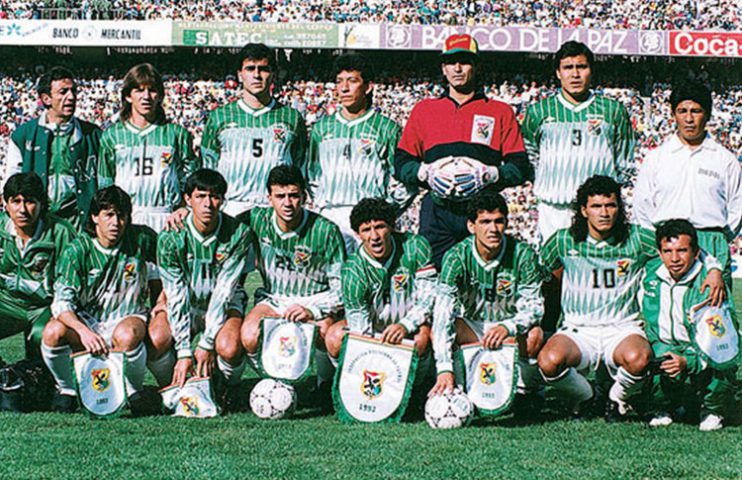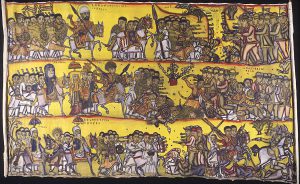Ten countries, eighteen soccer games, one dream. Qualifying for the World Cup. World Cup soccer occurs every four years in a rotation of different countries. The World Cup is the biggest soccer tournament in the world. It includes thirty-two national teams from all around the world that qualifies. These teams have the honor to represent their country in front of millions of fans around the world! Each country that has a national soccer team approved by FIFA (International Federation of Football Association) can become a World Cup qualifier. South American qualifiers for the World Cup are very hard to come by, as each national team has to play against the other nine countries. Each South American country plays a total of eighteen matches, which are nine home games in their respective countries, and nine other away matches in the country they play against.1

Eleven extraordinary players were chosen to defend the Bolivian soccer badge for the World Cup qualifiers that took place from August 1 to September 19, 1993. All of them made history together and each player helped achieve the dream. Moreover, three players of the national team played insanely well and carried the team on their shoulders. They were: Carlos Trucco, the 5’11” goalkeeper, Luis Ramallo, the “Pescador” being a lethal central forward scoring goals against most of the other teams, and the one and only captain of the team Marco Antonio “El Diablo” Etcheverry. This journey began way back in 1925 when the team was founded; the team began participating in international tournaments in 1926. The World Cup tournament began in 1930, and ever since,Bolivia has participated in the World Cup qualifiers every four years.2
On September 19, 1993, the sun shone brightly over the stadium Monumental Isidro Romero Carbo in Guayaquil, Ecuador, as fans from Bolivia and Ecuador entered the stadium to see the final qualifying match for the World Cup. Bolivia needed to win or at least tie the game in order to qualify for the World Cup and make their dream a reality. Bolivia had a total of 10 points, leaving them in leading position. Brazil had 9 points, and Uruguay had 10 points. This meant that Bolivia needed to tie or win in order to secure their participation at the World Cup in the United States in 1994.3
Before making it to the last game against Ecuador, Bolivia had a really tough journey through qualifiers. In the time frame of a month and a half to two months, Bolivia would call up all their players for a team training in order to be in shape and to know how to play as a team. They could only meet after that period of time, because each player belonged to an individual soccer club, and they had to play for their clubs as well. Each player was expected to remain in shape and demonstrate his skills in his respective club, in order to be called to the national team. When the players were together, they trained early mornings, at 6am or 7am for about 5-6 hours a day at high intensities. The coach, Xavier Azkargorta, was in charge of the team trainings and matches. Players had physical training, they had mandatory gym, and they would do their respective workouts in order to be at their best condition. Players also had to complete a psychological session two times a week in order to be at their best mental capacity and be focused on the goal. Finally, the coach, Azkargorta, gave some strategic lectures before the games in order to motivate the players and let them know their roles in the game. Players needed to be prepared to play in the high temperatures of Colombia and Brazil. There were great rivalries, and there were the legends of Brazil, Argentina, and Colombia. Bolivia needed to take advantage of the altitude in their home games in La Paz, Bolivia, at more than 12,000 feet above sea level.4
The journey was difficult, but Bolivia won 3 out of 4 home matches against prominent teams like Brazil, Venezuela, and Ecuador, and they also had some positive results from away games. All these results allowed Bolivia to be at the top of the table, leading Group B on the qualifiers. There was one more match to go to define the top two teams in Group B, in order to keep playing to qualify to the World Cup. The last match was against Ecuador as an away team. Three teams depended on this match (Bolivia vs Ecuador) and their own matches. Bolivia, Uruguay, and Brazil depended on the results of this match. Bolivia had a total of 10 points, Brazil had 9, and Uruguay had 10 points. Bolivia only needed a tie to secure a place and go on to the next round. The other match was Brazil against Uruguay. Once again, Uruguay just needed to tie in order to secure their place and Brazil only had the option to win in order to secure a spot. Both matches began at the same time and the three countries were fighting to keep playing for a World Cup spot!5.]
The ball started rolling through the green grass of the stadium Monumental Isidro Romero Carbo in a difficult match between Ecuador and Bolivia. Both teams on the field were running around, passing the ball to their teammates, and using each coaches’ tactics to achieve a common goal….to score. Everyone was frantically nervous in the stadium, moving their heads from side to side enjoying the game. Javier Azkargorta was screaming to the players to move faster and do the strategy they had practiced all week during training. Azkargorta relied heavily on his three great players, but surprisingly the entirety of the Bolivian team throughout the tournament showed great unity and that together as a team, they played great.6

“El Diablo” Etcheverry began making his moves dribbling past many Ecuadorian players and passing the ball around. “El Pescador” Luis Ramallo tried shooting the ball to the back of the net whenever he could. Nevertheless, the Ecuadorian goalkeeper was saving everything. The match continued…it was pretty close…both Bolivian and Ecuadorian fans supporting and screaming chants to their players. You could hear a clear and loud “BO-BO-BO-LI-LI-LI-VIA-VIA-VIA VIVA BOLIVIA!” Time went by and Bolivian players began to feel more and more nervous every time. It wasn’t until minute 44 where Ecuador tried to score a goal and made a very dangerous move. The great goalkeeper Carlos Trucco stopped the ball and began a counter attack play. He threw the ball straight to Erwin Sánchez’s feet to start running. Erwin goes past one player, does a magnificent touch with Etcheverry, and continues his hustle through the field to find himself positioned in front of the goal…and took a shot. It was a powerful shot straight to the goal and the goalkeeper barely stopped it. The goalkeeper let it bounce, and the one and only William Ramallo appeared to blast the back net and score! All the people in green jerseys and all the Bolivian fans shouted “GOOOOOOOL” running around celebrating with one another. William Ramallo scored a goal that marked history for Bolivia and for Bolivian sports. This goal not only meant that Bolivia was winning the game, but Bolivia was going to the World Cup! The match went on and Bolivia kept their same style of playing to keep this result and achieve the dream they had, to qualify for the World Cup. Getting through the end of the match, Ecuador scored a goal and equalized the game. Chills ran through every Bolivian player as they felt nervous again for the last minutes. Their dream was so close, but the final minutes were forever! Players ran with all their heart defending their goal to not let Ecuador score another one. And at last…the match finished! Bolivia for the first time in history qualified for the World Cup. To the World Cup USA 1994! Tears of joy all around, hugs, kisses, and smiles on every Bolivian around the world. The Bolivian national team made it!7
It was a Friday with an infernal heat: almost a hundred-degree in the stands, and it felt even more atrociously hot on the field. Hours before, the enormous stadium, Solder Field in Chicago, was replete with people holding flags from their respective countries; many Bolivian and German flags were held proudly as they waved through the air. Faces painted with their country colors, smiles all around, different languages spoken and many more cultural differences before the opening match.

Everyone eagerly waited for the start of the World Cup, even in a not soccer-oriented country of the United States. Many of those people talked about the inaugural game. Bolivia was about to face the defender of the title, the powerful Germany and its stars. At this precise moment, Bolivia was about to begin their first World Cup ever! After they lost their inaugural match against Germany, suffering a tough loss 1-0, Bolivia demonstrated what they were made of. Their following match was in Boston, against South Korea, where Bolivia tied 0-0 with a remarkable performance. That was the first point won for Bolivia at the World Cup. People regardless supported the national team and they saw each match with a feeling of pride as it was a historical moment. Their last match was in Chicago against another preeminent country, Spain. Consequently, this difficult match led to numerous goals against Bolivia, and they suffered another tough loss of 3-1. Moreover, due to these results Bolivia did not qualify to the following round of the World Cup and returned home. Although they came back with these results, everyone saw them with pride and they cheered for them on their return as they were heroes in the eyes of their people.
- Eduardo Bolaños, “Histórica clasificación de Bolivia al Mundial 1994,” September 2015, Conmebol (website), http://conmebol.com/es/19092015-1041/historica-clasificacion-de-bolivia-al-mundial-1994. ↵
- Carlos Mesa, “Bolivia en la Copa del Mundo, Capítulo 3. Estados Unidos 1994,” July 14, 2014, Historiadelfutbolboliviano.com (website), https://historiadelfutbolboliviano.com/2014/07/14/bolivia-en-la-copa-del-mundo-capitulo-3-estados-unidos-1994/ ↵
- Gabriel Caero, “Bolivia, a 25 años de la clasificación a EEUU 1994,” Los Tiempos (Cochabamba.), September 17, 2018, national edition. ↵
- Encyclopedia Britannica, May 15, 2019, s.v. “World Cup,” by Amy Tikkanen. ↵
- FIFA, Last modified 2019, https://www.fifa.com/worldcup/archive/usa1994/teams/team=43923/matches.html ↵
- Joaquin Cavanna, “La Bitácora del Mundial: Bolivia y sus 15 años entre el cielo y el infierno,” June 2009, Goal (website), https://www.goal.com/es/news/2123/colombia/2009/03/31/1183063/la-bit%C3%A1cora-del-mundial-bolivia-y-sus-15-a%C3%B1os-entre-el-cielo. ↵
- Jaime Ayllón, “Mundial ‘USA 1994’: Todo comenzó en un modesto hotel,” laRazón (La Paz.) (website), September 17, 2018, national edition. ↵



17 comments
Francisco Cruzado
This text reminded me of all the hype I felt when Peru returned to the World Cup after nearly 55 years of what seemed as a sempiternal failure. I can feel the emotion of the public and the whole country in itself, and I see vividly the cheers, the joy, the hugs, the “Gol!” that always follows a moment of glory. I specially liked the description of the gol that Etcheverry set up and led them to greatness. I also imagine the hundreds of Bolivians in the US, excited for their players and their energy. It was the same for all the Peruvians who travelled or were living in Moscu at the time. Excellent article!
Sara Guerrero
The World Cup is definitely a very competitive event and in my view after reading this story I feel sad for the team since they worked so hard to get qualified. It is more sad after they’ve been qualified that they lost against Germany, South Korea, then Spain. They did show a lot of effort and determination to keep going and that’s what is most important is that they didn’t see themselves as a bad team, but just a team like any other team who puts as much effort and hardwork into their practice and games.
Sara Guerrero
The World Cup is definitely a very competitive event and in my view after reading this story I feel sad for the team since they worked so hard to get qualified. It is more sad after they’ve been qualified that they lost against Germany, South Korea, then Spain. They did show a lot of effort and determination to keep going and that’s what is most important is that they didn’t see themselves as a bad team, but just a team like any other team who puts as much effort and hardwork into their practice and games.
Giselle Garcia
It’s nice to read about an underdog story like this article published here. The pressure must have been very high for the Bolivia team to qualify for the World Cup, and I could feel it as the game against Ecuador was being told. I applaud their endless determination to keep their heads in the game even after they scored, which showed how much Bolivia wanted to qualify. But when they finally secured their spot in the World Cup, that feeling of excitement and success was conveyed strongly in the story. Even though they didn’t win their games during the World Cup, they were still admired for their efforts.
Juliana Montoya
As a huge soccer fan, I love to read articles about the beautiful sport and how inspiring it is to be a part of the FIFA World Cup. Bolivia was a strong force and it is very admirable to read an article that demonstrated what a team is all about. The Bolivian team was undoubtedly good and it was nice to read that they ended up qualifying for the World Cup despite going through all the hardships.
Raul Colunga
Awesome article about a story I had never heard, also great writing. Throughout the article I felt like I was with the team preparing, in the stands during the qualifiers, and in Soldier Field. Everyone loves an underdog story and the qualifying group was very close, so just making it to the World Cup is a feat on its own. It is a shame that Bolivia had to play against such powerhouse teams, but just the experience of playing at the World Cup is something to brag about for the rest of your life.
Luis Jaen
This article is such an amazing “feel good” article. From the preparation aspect of the psychological sessions to the play-by-play analysis of the game against Ecuador, I felt as though I was living in the moments with the Bolivian players. Being someone who is a huge fan of soccer, it was amazing to see the journey traveled by this Bolivian team and appreciate the results against these major countries like Germany and Spain, even though they were not wins.